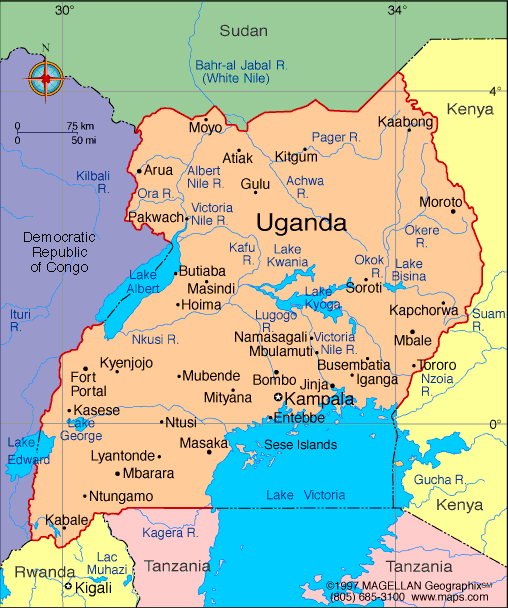 |
| the Ugandan country flag |
Greetings, all!
Some of you may know, but for those of you who do not, I have been awarded a Fulbright Research Grant to conduct research at the Uganda Cancer Institute/Mulago Hospital in Kampala, Uganda from December 11th, 2013-July 11th, 2014. In a few short weeks I will be leaving the United States, and I wanted to set up a blog to provide a way to keep everyone (who may care) updated on my life in Uganda. I am not a blogger, and I do not really enjoy writing my thoughts down but I will do my best to make sure that I try to update this at least once every 1-2 weeks.
First things first: What am I going to be doing in Uganda?
My project will be focused on a disease called glucose-6-phosphate dehydrogenase (G6PD) deficiency. G6PD deficiency is the most common enzyme defect in the world, affecting nearly 400 million people worldwide. It is especially prevalent in sub-Saharan Africa, which makes Uganda an ideal location for researchers to study the disease. G6PD deficiency is usually not life-threatening, and someone may even live with the disease without even knowing it. G6PD deficiency can, however, affect the way the body in many ways. Of interest to me is the way the body handles oxidative stress. This might be sort of a lengthy explanation.... so bear with me if you care about the science :)
The body produces billions of chemical reactions everyday, and some of these reactions produce harmful oxidants. Oxidants can cause damages to the bodies cells, so we are told to "eat our fruits and vegetables" because they contain
anti-oxidants. The anti-oxidants help to prevent cellular damage. Although we can get anti-oxidants from our diet, our body also makes anti-oxidants. An individual with G6PD deficiency has a defect in one of the pathways that makes an anti-oxidant called glutathione. We think that individuals with G6PD deficiency will have higher levels of oxidative stress than individuals who do not have the enzyme defect. High levels of oxidative stress is bad because it can cause cell death, DNA damage, and ultimately cancer (we think).
My study attempts to determine if individuals with G6PD deficiency have high levels of oxidative stress. We will do this by collecting blood samples from patients at Mulago Hospital and running tests to compare oxidative stress markers. The correlation seems logical, but no one has ever done it before! Hopefully this research will help us better understand G6PD deficiency and risks for patients who have it.
Dr. Troy Lund, MD, PhD is my research mentor at the University of Minnesota who helped me develop this study. Dr. Lund has been traveling to Uganda for over 10 years, and he will help orientate me during the first week in Kampala. He is also providing the funding for the research materials (the Fulbright Grant only funds my living expenses). I owe Dr. Lund many thanks for his help and guidance throughout the years of research in his lab.
For more information on G6PD deficiency:
Wikipedia G6PD deficiency
More questions on my project? Comment below! Thanks for listening, and stay in touch!
-Paul

